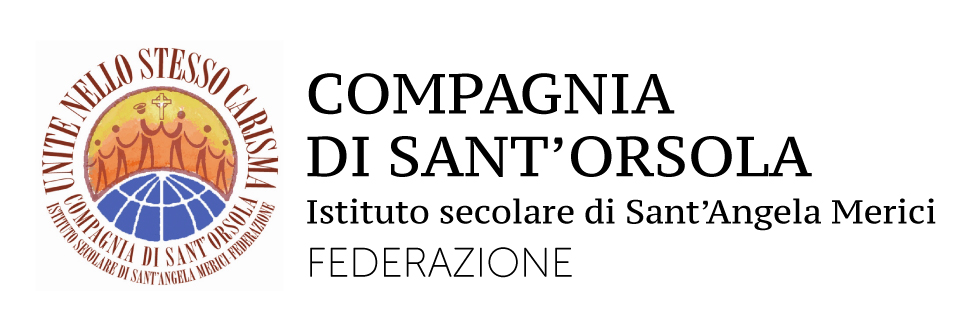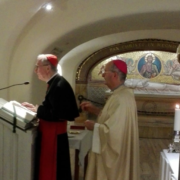Greeting from Cardinal Pietro Parolin
Rome, July 11, 2018, Feast of St. Benedict of Nursia, St. Peter’s Basilica at the tombs of the Popes
Greeting from Cardinal Pietro Parolin, Vatican Secretary of State
This year the Eucharist occurs at the tomb of Saint Peter, a particularly significant place. I did not want to miss this particular encounter, and I greet all of you, who represent the Federation of Companies of Saint Ursula, Secular Institute of Saint Angela Merici, here in Rome for your ordinary Assembly.
Cordial good wishes to the out-going leadership who arrive at this point with so much fruit ripened in these years, and sincere good wishes also to the new leadership, that they may be able to do productive work in service to your Company.
I have read one of your magazines from 2016, devoted to presenting the history of the Federation of the Company of Saint Ursula that was edited by Prof. Gheda, to the effect that the Merician charism substantially has four calls: the call to holiness, the call to console and to confer dignity, the call to renewal, the call to bring light into the world and into history. Yours is a beautiful vocation, a very beautiful vocation, a very beautiful call.
I would like to comment on this vocation, this call, from a practical angle, remembering the great person whom we celebrate today and whom the liturgy presents for our veneration and imitation: Saint Benedict of Nursia, the father of western monasticism, teacher of civilization, and luminous example of holiness. If we wanted to summarize his teaching, we could do it this way: Humanity has a single fundamental duty and task: to seek God, because a human being does not develop fully all alone and is not completely fulfilled all alone; a human being cannot be completely happy without God or against God.
When all is said and done, Benedict merely represents with a different variation the fundamental thought of Augustine at the beginning of his Confessions: “You have made us for yourself, O Lord, and our hearts are ever restless until they rest in you.” This is also the source of his program of life for monks, summarized as “Put nothing ahead of the love of Christ.” And in this, dear brothers and sisters, consists that holiness that Pope Francis recalled and recommended to all Christians in his recent apostolic exhortation, “Rejoice and Be Glad.”
It is a call and a proposal valid for every Christian, more than ever in our epoch, when we feel the need to anchor life and history to solid spiritual reference points. This is the pathway of holiness that you too, dear sisters, must travel.
This is the only way that daily renewal will be possible, this is the only way you will be able to carry light to the world and to history, consolation and dignity to those deprived: by searching for God and putting nothing before the love of Christ. Now too the world needs women who belong completely to God and experiences of closeness; it needs women capable of generous service and of bringing people together; it needs women who love the Church and are obedient but who also know how to support it and stimulate it with suggestions that have matured in conversation with Christ and in direct experience in the fields of charity and assistance to the sick, to the marginalized, and to children in difficulty.
On this point, Pope Benedict XVI said, “It is the gift of a maternity modeled after Mary. The Madonna’s heart is the cloister where the word continues to speak in silence. At the same time, it is the furnace of charity that motivates courageous deeds from a place of a persevering and hidden form of sharing.”
I close these brief reflections, hoping that they are simply an expression, an affirmation of my esteem, my affection, closeness and encouragement.
I wish you every good thing in your personal apostolic life, and I assure you of my prayer, while I entrust myself to your prayer in this Eucharist you are about to celebrate. Have a good day and a good journey.


